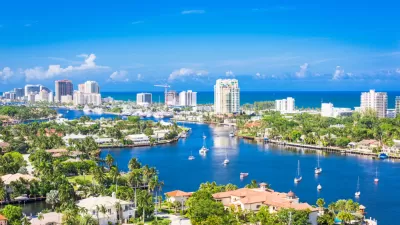Miami Beach is drafting its own textbook for how to respond to sea level rise. The New Yorker provides in-depth coverage of a region under siege by the sea that surrounds it.
Elizabeth Kolbert surveys the scene in Miami Beach—where a collection of scientists and politicians agree—sea level rise is going to very very, very challenging for the city.
First interviewed is Hal Wanless, chairman of the University of Miami Department Geological Sciences, whose studies have him led to conclude "that much of the region may have less than half a century more to go."
Organizations as varied as the Intergovernmental Panel on Climate Change, the United States Army Corps of Engineers, and the National Oceanic and Atmospheric Administration differ on how much seas should be expected to rise. According to Wanless, all those organizations are probably being too optimistic.
Meanwhile, ice shelves in Greenland are melting quickly, opening new "floodgates." According to Kolbert, "Greenland’s ice holds enough water to raise global sea levels by twenty feet."
Miami Beach's response to the pending threat has had implications in the political sphere. Miami Beach Mayor Philip Levine was elected in 2013, according to Kolbert "after airing a commercial that tapped into voters’ frustration with the continual flooding. It showed him preparing to paddle home from work in a kayak."
Kolbert immediately increased stormwater fees to fund the installation of "enormous underground pumps that will suck water off the streets and dump it into Biscayne Bay." So far the city has completed six pumps, with 44 more planned.
The long read article includes a lot of narratives and dispatches from specific locations. Kolbert also draws connections to the larger region of South Florida, to the politics of the state's Republican leadership, like Governor Rick Scott and Senator Marco Rubio, who have both proven staunch in opposing denying regulatory or other policy responses to climate change, and to the large-scale interventions that will be necessary for the region to remain habitable in the future.
FULL STORY: The Siege of Miami

Maui's Vacation Rental Debate Turns Ugly
Verbal attacks, misinformation campaigns and fistfights plague a high-stakes debate to convert thousands of vacation rentals into long-term housing.

Planetizen Federal Action Tracker
A weekly monitor of how Trump’s orders and actions are impacting planners and planning in America.

In Urban Planning, AI Prompting Could be the New Design Thinking
Creativity has long been key to great urban design. What if we see AI as our new creative partner?

Florida Seniors Face Rising Homelessness Risk
High housing costs are pushing more seniors, many of them on a fixed income, into homelessness.

Massachusetts Budget Helps Close MBTA Budget Gap
The budget signed by Gov. Maura Healey includes $470 million in MBTA funding for the next fiscal year.

Milwaukee Launches Vision Zero Plan
Seven years after the city signed its Complete Streets Policy, the city is doubling down on its efforts to eliminate traffic deaths.
Urban Design for Planners 1: Software Tools
This six-course series explores essential urban design concepts using open source software and equips planners with the tools they need to participate fully in the urban design process.
Planning for Universal Design
Learn the tools for implementing Universal Design in planning regulations.
Gallatin County Department of Planning & Community Development
Heyer Gruel & Associates PA
JM Goldson LLC
City of Camden Redevelopment Agency
City of Astoria
Transportation Research & Education Center (TREC) at Portland State University
Jefferson Parish Government
Camden Redevelopment Agency
City of Claremont





























